Aboriginal Guardianship Support Model Project Background
AbSec is undertaking a review of the guardianship program, with a view to design an effective support system based on the needs of Aboriginal children, families and communities. AbSec is seeking feedback about guardians’ recent experiences with guardianship. The information obtained will be used to guide the new support for guardians and carers of Aboriginal children. We will seek your consent, and all information and details will be strictly confidential.
If you would like more information about the project, visit our guardianship page or read on for a history of the project.
Conversations with guardians about guardianship support
AbSec held interviews with guardians to gather their insights and advice on services and supports for Aboriginal children with guardianship orders and their families and bring people together to design a new model of guardianship support.
Some quotes from families include:
- Why do we not get regular information provided, aren’t we the ones that this impacts on and are in turn managing the impact on the ones we support? We are so busy just living our lives and supporting our extended families we don’t have time to wander the internet to find out what has changed for us in out-of-home care and guardianship care.
- I had a good caseworker, who would stay for a couple of hours when she visited and on occasions would stay for dinner.
- To have an Aboriginal mentor teach life skills and about their culture – it would be a good thing.
- Whilst the interviewer was speaking with the guardian – the guardian said they were making dinner for themself and the kids, to which the interviewer said, ‘who would want to move out of home when you are cooking meals and cleaning for them’. The guardian laughed and said, ‘I would do anything for the children’.
The topics that have emerged from the interviews with guardians have included:
- Cultural support
- Government support and contingencies
- Family contact
- Guardian, care, support, transition
- Identity documents
- Medical support
- Dental support
- Respite
- Third-party support services
The invaluable information provided by guardians and carers was used to inform activities and discussion during community workshops and form the basis of challenges and opportunities in the design of the new model of guardianship support.
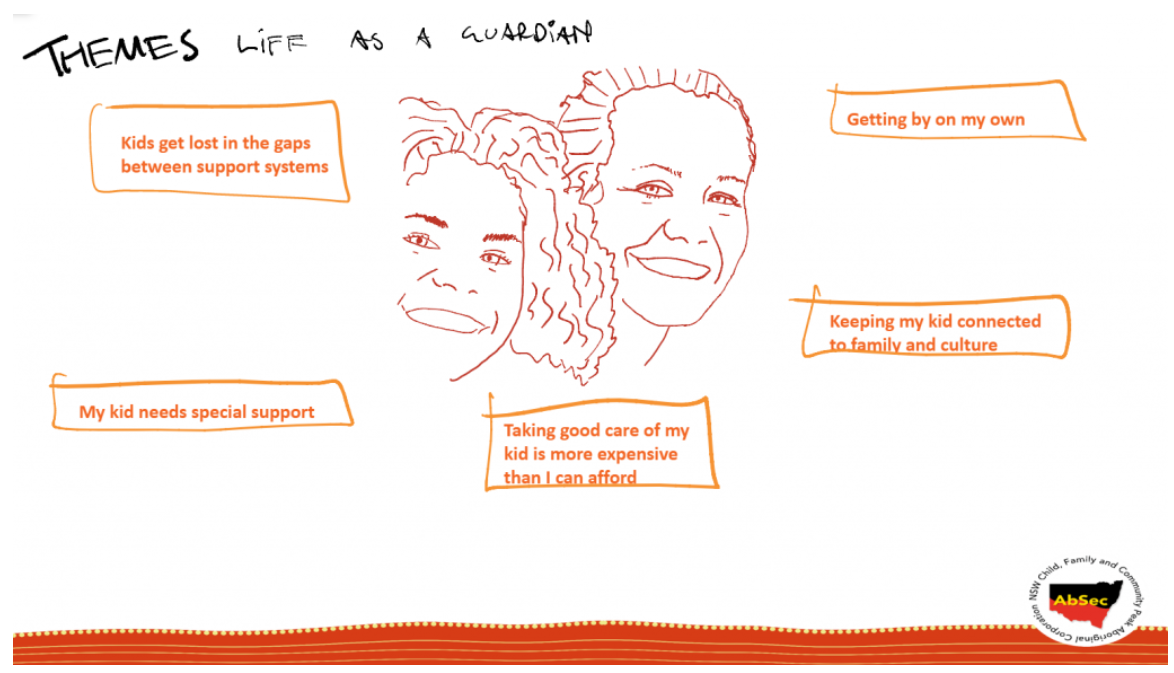
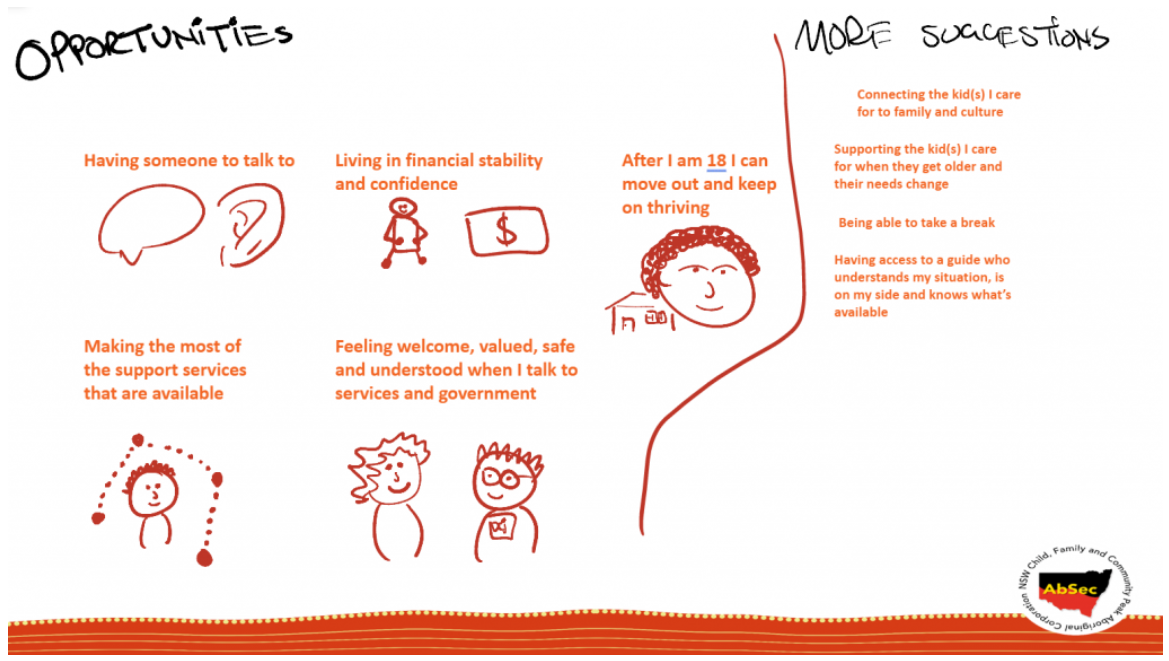
About the Aboriginal Guardianship Support Community Workshops
Based on the feedback and advice from guardians, AbSec organised a series of locally-based co-design workshops to define and develop the ideas about supports that guardians, carers and community families saw as needed for their children to thrive.
The workshops were a great opportunity for Aboriginal people, communities and organisations to influence the development of new supports. The ideas and opportunities we designed together at the workshops were developed into a new model of guardianship support.
What did we want to know?
At the workshops we wanted to hear about:
- What it means for Aboriginal children and young people on guardianship orders to thrive
- How can these Aboriginal children and their families be supported to thrive
- Your experiences to understand and learn more about what’s needed
- Opportunities to do things better
- Ideas and opportunities for a new support model we can test.
What happened after the workshops?
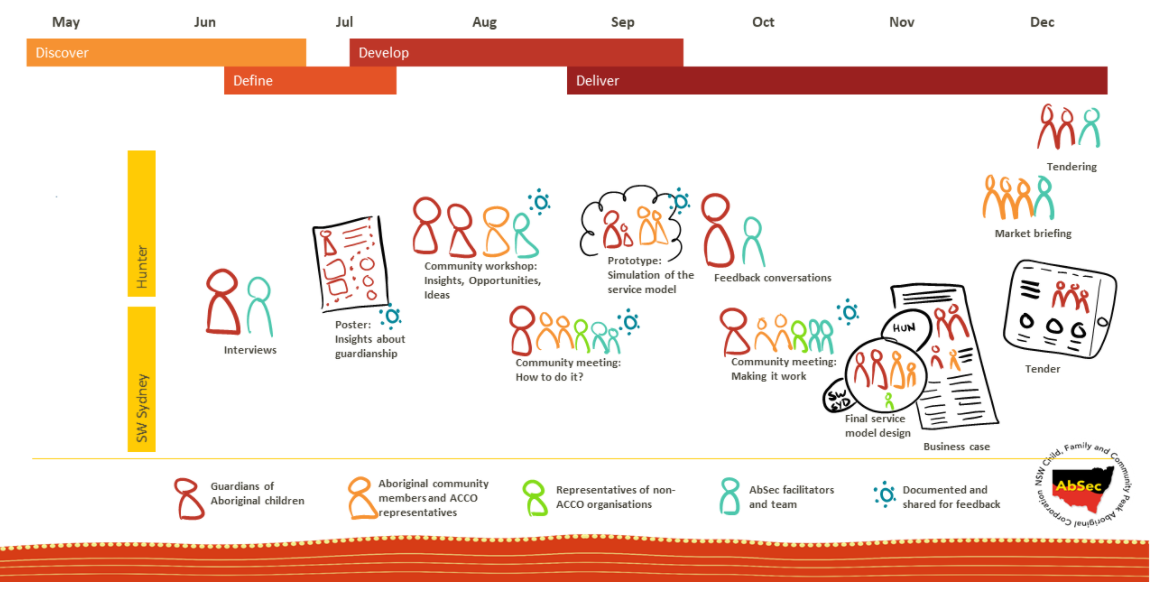
After each workshop, we sought feedback on the ideas and solutions being designed:
- August 2020: we shared information outlining the ideas from Aboriginal people and communities and the key themes that emerge from the local workshops
- September 2020: we shared information on the service design created in the workshops and test some design elements with the kids, guardians and communities for feedback
- By October 2020: we finalised the design for acceptance by the people co-designing the supports
- December 2020: we released the report on the model and information outlining the value of the design solutions, ready for implementation.
- January / February 2021: we submitted the report on the model to the NSW Government for decision-making on funding an Aboriginal Guardianship Support Model
- March / April: we are readying AbSec to be the commissioning of the trial services to test the support model in two locations
- May 2021 onwards: Once funding is negotiated, we will guide the Aboriginal child and family sector on the implementation of the model
The Model of Support
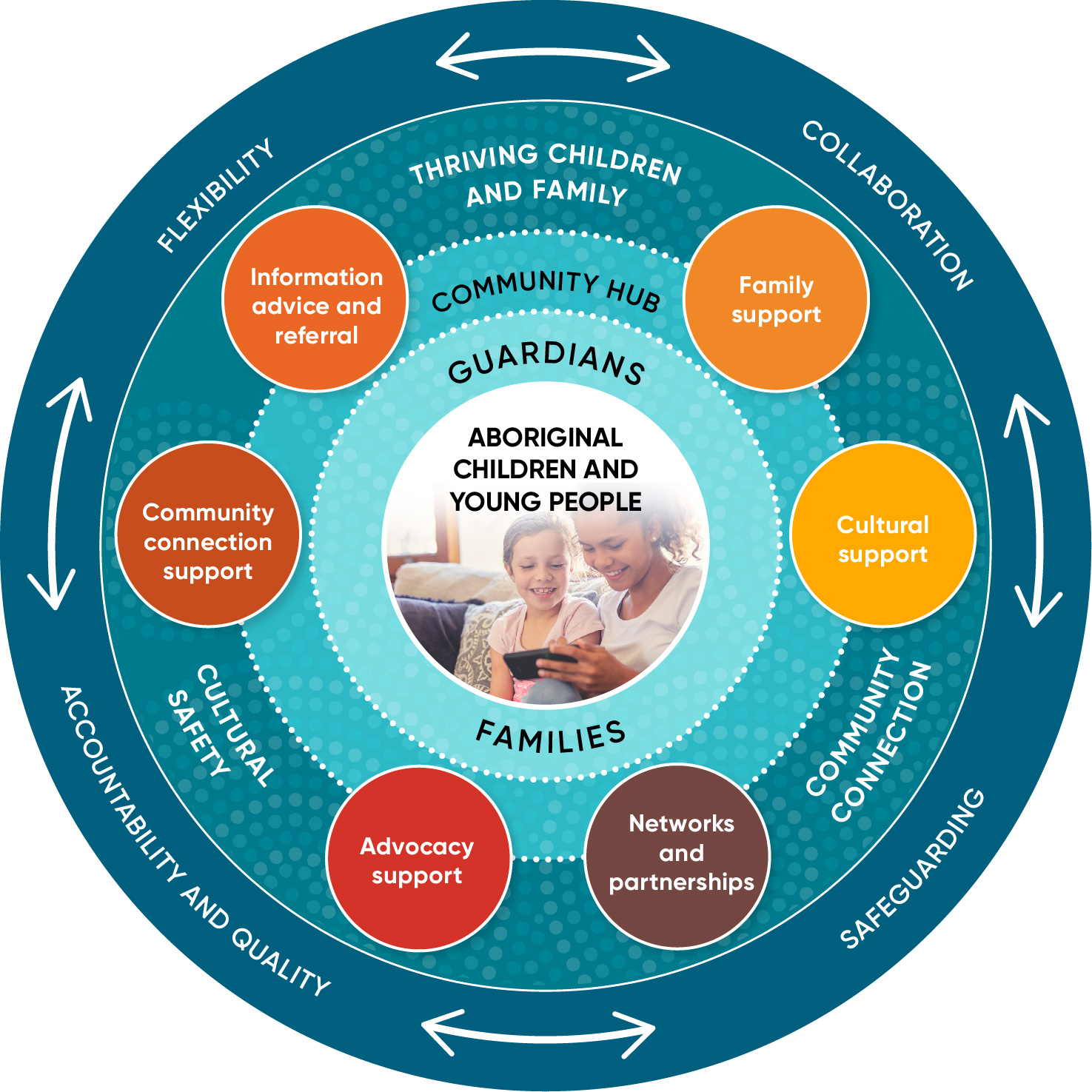
The Service Components of the Model
The core service components, which are outlined in Figure 3 above, were identified by collaborators as important during the service co-design in the Hunter and South West Sydney. These areas of support were found to be comparable in both trial locations, mainly because families across the districts had experienced similar circumstances in transitioning to guardianship.
The complexities of each potential service user’s circumstances, however, are unique and individual. Therefore assistance will need to be tailored and not ‘one size fits all’. Service users also articulated there should be a ‘no wrong door’ approach to in-service support.
Note: the experiences and needs in other areas and communities of NSW are expected to be different.
The service areas identified as required are:
- A local Community Hub – one point of contact, cultural and physical safe space, one-stop-shop, ability to drop-in service with someone trusting to talk to, with a trauma-informed support service who understand their circumstances and understand Aboriginal families
- A family-centred support service – working with children and young people, their guardians and families with goal planning and to support achieving their aspirations and their goal plan (management and implementation) including financial planning and cultural planning, particularly where no formal plans exist with their care orders; addressing practical barriers to accessing supports and services, including therapeutic needs; and improving their skills and relationships, supporting and drawing on individual and family strengths and decision making; emergency after hours-call service
- Information and advice on matters around guardianship, as well as on available community services and supports; assistance navigating access to culturally safe, targeted and universal services – including health, medical, dental, wellbeing, mental health, healing therapy, behavioural and other therapies, legal, government services: and referral to appropriate services
- Support and referral – to locate and access specialist services when needed and at the intensity needed – family & therapeutic counselling, Aboriginal Family Therapy specialists, therapists for trauma, healing, challenging behaviours, LGBTIQI needs, domestic & family violence, and drug and alcohol issues, disability and NDIS support for example.
- Advocacy support – to better navigate and access services and support including government services, Department of Communities and Justice, Centrelink, legal, education, justice, housing, health, out-of-home care provider agencies
- Brokerage – access to flexible funds linked to achieving their individual and family goal plans, including teenagers shaping their future to have the skills and confidence to live independently, while arrangements for contingency funds through the Department of Communities and Justice can be negotiated under a Financial Plan and Cultural Plan
- Connection to culture and Country – developing cultural plans with Aboriginal children and young people and their guardians, carers and families, particularly where no ongoing case plan, financial plan and cultural plan exists; help with accessing support for their cultural plans; assisting families with implementing their plans and strengthen connections to family, mob, Elders, family events and ceremonies; being on Country to strengthen their belonging; and additional support for guardians who are not Aboriginal
- Connections to community and mentor support – strengthen community links, participation and involvement, connection to community and cultural activities, events, camps for example – building connections with the Aboriginal community – local Aboriginal land councils, Aboriginal Community Liaison Officers etc for local requirements and expectations; having facilitated peer support groups; activities and training; local young people’s support network, training and activities – having a voice
- Connections to local networks and service partners – based on service and stakeholder mapping of the area, forming a network or forum of organisations and agencies as there are likely additional resources available to support the client group – representatives from education; training; housing; Aboriginal and mainstream health – medical, mental health, healing; Aboriginal family services, community youth support; legal aid and Aboriginal Legal Services; Centrelink Aboriginal Services etc; and Aboriginal community.
The core service components are sketched out in the figure below.
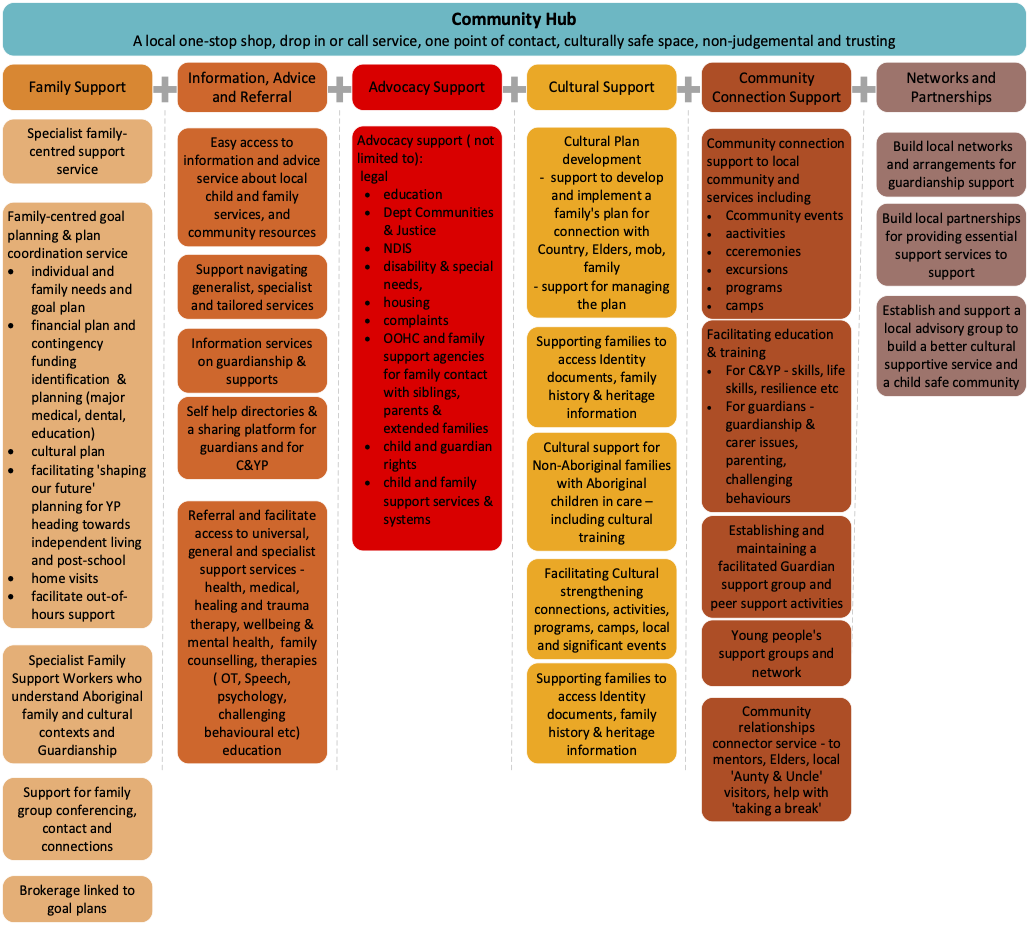
Meet our AbSec team working on the Aboriginal Guardianship Support Model
Our staff who may contact you, or you can contact, throughout the project are:
Our non-Aboriginal staff supporting the Aboriginal Guardianship Support Model are:
| Name and position | Background | Contact details |
|
Alison Chatfield Carer Support Manager (Project contact) |
Alison manages the AbSec Carer Support program, including the carer telephone and referral service, administration and reporting. |
AbSec Carer Support Line: 1800 888 698 M: 0422 215 321 P: 02 9559 5299 |
|
Tracey Keevers-Keller Group Manager Operations (Executive Leader) |
Tracey leads AbSec’s commissioning, projects and operations teams. Tracey is responsible for AbSec’s work that focuses on delivering a quality Aboriginal child and family sector and Aboriginal-led solutions. |
P: 02 9559 5299 |
|
Zeke Shaw Project Manager, Cultural Connections (Workshop Facilitator) |
Zeke has a background in teaching and has worked all over the state in Bourke, Brewarrina and Grafton. He’s also a footy fanatic and has even refereed the Koori Knockout final! Zeke’s work at AbSec involves supporting Aboriginal families, carers and support workers. He’s passionate about approaching all his work through the four cultural pillars upholding the Aboriginal cultural blueprint: trust, respect, space and place. |
M: 0438 297 039 |
Our non-Aboriginal staff supporting the Aboriginal Guardianship Support Model are:
| Name and position | Background | Contact details |
|
Gillian Thacker Project Manager |
Gillian works with the Guardianship Support project team, having worked previously with the Active Kids Program, Office of Sport; Department of Education with Community Grants programs including Aboriginal Community Programs, Links to Learning and the Koori Youth Program; and community support organisations in Sydney City and South Sydney. |
P: 0488 258 886 |
|
Craig Jung IT Business Systems Manager |
Craig supports the IT and business systems implementation for the commissioning of the Aboriginal Guardianship Support Model. |
P: 02 9559 5299 |
Find out more about commissioning opportunities!
AbSec continues to work with Aboriginal communities and partners to explore ideas and co-design opportunities for investment to achieve better outcomes for Aboriginal children, families, communities and organisations.